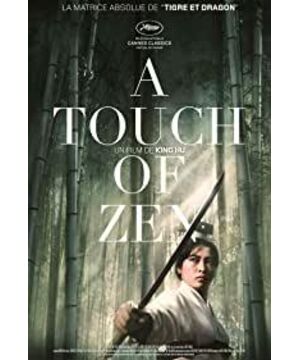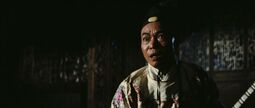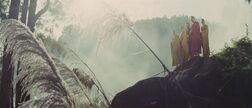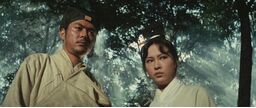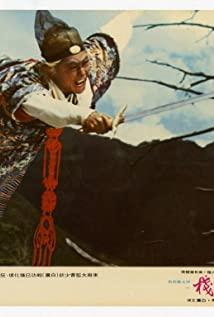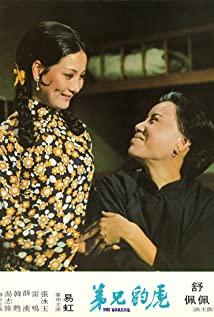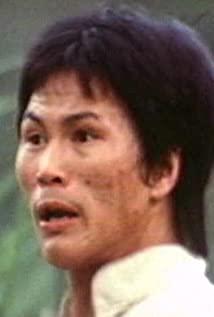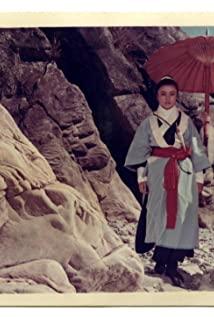The Hong Kong Film Archive held a "Collection of Collections" screening event in February. There was a glimpse of the word "Xia Nv" in the brochure. Although I am not a fan of Hong Kong martial arts, the name "Xia Nv" has been known for a long time. reason. The whole process of watching the movie was a wonderful feeling, 180 minutes, basically every minute gave me a different movie-watching experience, tension, excitement, surprise, shock, until the last 30 minutes of complete speechlessness, the film is over, I am already Bow down and worshipped Hu Jinquan. Then came the post-screening talk. Mr. Pu Feng from the archive introduced the background of the film and analyzed the structure of the film. This film is adapted from Pu Songling’s "Strange Stories from a Lonely Studio". It has surprised me. Although I haven’t read Liao Zhai completely, I still have some common sense about the characteristics of the story. However, there are no real monsters and ghosts in the whole film. There are only a few intentions by the characters The ghost effects and rumors created, I guess this shouldn't be the original appearance of the story of Liao Zhai. After listening to the introduction, I realized that it was indeed quite different from the original story. After listening to the original story, my surprise was beyond renewed. The original story is actually a love triangle. In addition to having a relationship with Yang Huizhen, Gu Xingzhai also has a relationship with Ouyangnian. Yang Huizhen and Ouyangnian are jealous of each other, but it turns out that Ouyangnian turned out to be a fox. The original description of the homosexuality is as follows: "One day, when I was born, I sat on my head, and a young man came to ask for painting. The appearance was very beautiful, and the meaning was quite awkward... The next three or two days, I will be a little familiar, and gradually ridicule; I hugged it and didn’t reject it, so I kept it private, and came and went very much.” This is unimaginable. In Pu Songling’s era, the plot of homosexuality was written into the story so boldly and modernly. The movie has to delete this paragraph, whether this is progress or retrogression of the times. In addition to deleting the homosexual plot, the original work does not explain Yang Huizhen’s background and background, and the film adds elements such as the imperial court, Dongchang Fanzi, Zhongliang, etc., which adds a layer of meaning to the word "Xia", which also contains a lot of it. The article can be made. The loyal officer was framed brutally, and the heroine was protected by two generals and fled all the way, avoiding the court's chasing soldiers. This kind of plot is really similar to the current situation. I won’t talk about it specifically, you know. There is no dialogue at the beginning of "Xia Nv" for more than seven minutes. It is all scenery rendering and character actions, plus the background guqin music. It seems that everything is ready to go, and the story unfolds so slowly. I am afraid that the most impressive thing is photography. Time is far away and time is close, left and right, high and low angle switching fast, the speed of lens expansion and contraction, the photographer seems to be playing with the lens wantonly for fear that the audience does not know his existence. In addition to photography, another major feature is the soundtrack, the sound of the piano is very distracting. Mr. Pu Feng said that Hu Jinquan did not seem to focus on the storytelling. How the story develops is not important to him. What is important is the feeling of the picture, the so-called aesthetic effect. However, I humbly thought that Mr. Hu was also unique in the narrative of the plot. The first half an hour created a totally horrible atmosphere of ghost movies, such as ruined temples overgrown with reeds, the jingling of temple bells, the sound of thunder every time "just right", plus scholars-this usually appears in gods. The elements in the ghost film and the suspenseful atmosphere are simply perfect. Silly scholar + gorgeous female ghost, what a traditional Liao Zhai element, so at first I really thought that Yang Huizhen was a female ghost. But if the story develops in this way, I am afraid that it will fall into a cliché and be overwhelmed. Fortunately, there will be a year of Ouyang. Ouyang Nian's appearance was completely a gentleman. There were several close-up shots of his eyebrows. Although his whereabouts were mysterious, they never aroused my suspicion. Even until the blind stone was injured in the rain, I still thought that maybe Yang Huizhen and the blind stone were the villains. My hindsight is entirely because of Hu's ability to control the story and the character design of the characters. It can be said that it is the cliché that broke the traditional positive and villain roles. Director Hu made full use of the suspense elements of the story, and it took about an hour to reveal the source of the whole story. The highlight here is the editing. The transition between memory and reality through dissolve is wonderful. Next is the famous Battle of the Bamboo Forest. The editing features of martial arts action films began to develop, and to this day, the bamboo forest is still the first choice for many martial arts films. A piece of green is already very eye-catching, coupled with the wisps of sunlight leaking through the cracks of the branches, the beautiful scene is playing, and the audience can also watch it comfortably. Yang Huizhen and General Shi were invincible, and finally leaned over from the top of the branch and rushed down, giving the enemy a lethal sword. They couldn't help but call them too beautiful. Ouyang Nian died too quickly and too unjustly. It is a pity that such a beautiful man was injured so badly after hitting Yang Huizhen's darts a few times, and he became a corpse when he saw him later. The scene of World War I in the ancient temple is so dark. To be honest, I really can’t distinguish between friends and enemies. The contrast at the end also implies that this battle is not the final boss-level duel. After the Battle of the Ancient Temple, Gu Sheng laughed all the way to show the audience his strategy. This paragraph was so magical that he laughed at the hearts of unknown audiences. Later, Mr. Pu Feng said that Hu Jinquan seemed to show the audience " How do some ghost effects in "A Chinese Ghost Story" are made? The two films are inseparable, including a woman playing the piano and attracting scholars to go on a date. How similar. Hu Jinquan was not satisfied with the filming and production of "Qian", so he did it himself, imitated everywhere, but showed his personal characteristics everywhere. He is really an extremely cute director. Gender inversion is also worth mentioning. A frail scholar who lives by painting, encounters a glamorous chivalrous girl in white, and is so fascinated. Although the woman is dressed in white (symbolizing virginity), her performance is open everywhere, and she uses the sound of the piano to hook the scholar to have an inexplicable one-night stand with her, and then she still wears white clothes to show others. Xia Nu holds a sword (symbolizing male genitals) and martial arts are superb. When encountering an enemy, scholars can only retreat behind Xia Nu to escape. However, the scholar was unwilling to bow to the wind, and through his own "strategy" (nothing but cleverness), he regained his dignity and excellence as a male. The most obvious manifestation is that several minutes of wild laughter, as if regaining appreciation and regaining the status of a man. Such happiness is not something ordinary people can experience. But then he found that the corpses were all over the place, and Yang Huizhen had disappeared, but he immediately "lost her face" and called "Miss Yang~Miss Yang~" in fright. Seeing that the superficial majesty did not last long, and his cowardly nature was exposed. Exhaustive. The most subversive of tradition is the scene where Yang Huizhen left her baby with Gu Sheng, and no matter how absurd and unreasonable, "Yang Huizhen was still fighting desperately before, there was no sign of pregnancy, and a baby was born in a blink of an eye". "Women leave their children with men, but leave them behind." This is enough to cause controversy. Looking at today's society, most of them are romantic men who leave women behind after a one-night stand and go flying high. No one knows that the genders of men and women in this film are so inverted. The situation was like that in "Fried Rice with Freedom", Eleanor went to find Robert's theory of "It depends on Anita not to leave after eating" and threw out the sentence "Let's talk about it, how much money will it cost to let people go". How can the woman's active attitude and her subversion of traditional patriarchy not make me marvel and applaud. If the story ends here, it can be regarded as a more satisfactory ending. I will probably give it four stars, but the last 30 minutes surprised me. It is no exaggeration to say that I was in the last 30 minutes. I watched it with my mouth open and staring. It was too shocking. I almost jumped out of the theater and yelled: "The movie can be shot like this!" The English translation of A Touch of Zen began to be confusing. A bit of Zen? But the whole story tells about martial arts, duel between good and evil, love, and so on. What does it have to do with Zen? The answer is in the last thirty minutes. The monk appeared at a critical juncture every time and easily knocked the bad guys to the ground, followed by low-angle shots. The monk's face overlapped with the dazzling sunlight. At this moment, how could he not give people a sense of existence like a god! No wonder those who were defeated by him bowed their heads to him as if they had lost their souls. The final battle in the desert, in my opinion, is the most critical battle in the whole film. It is in sharp contrast with the narrow and dense bamboo forest before. An empty and desolate desert, with only the golden color of the sun, but not as vivid as the bamboo forest. green. This kind of battle is not a contest of martial arts, not a contest, but a contest of the soul. The monk Baimi had a sparseness. He did not expect to be deceived by the insidious villain, but he slowly walked to the top of the mountain and sat quietly under the sun. The sun formed a circle of Buddha's light behind him. With the music effect, that moment was really amazing. The mind of a person is born to the meaning of Buddha. Even the villain was blinded by the flash, and everything I saw was inverted (it was the first time in many years that I saw the inverted effect on the screen, I can imagine my shock). The final transcendent sanctification, emphasizing Zen, I think it is the most successful sublimation of the film. After watching the movie, I couldn't recover for a long time. I was immersed in the world of martial arts, Buddha and Zen created by Hu Jinquan and couldn't get out of it. I thought the words would never be able to tell the wonderful work of this god, the only reason for this is that you can understand it with your heart. Zen is starting to make people confused, a bit of Zen? But the whole story tells about martial arts, duel between good and evil, love, and so on. What does it have to do with Zen? The answer is in the last thirty minutes. The monk appeared at a critical juncture every time and easily knocked the bad guys to the ground, followed by low-angle shots. The monk's face overlapped with the dazzling sunlight. At this moment, how could he not give people a sense of existence like a god! No wonder those who were defeated by him bowed their heads to him as if they had lost their souls. The final battle in the desert, in my opinion, is the most critical battle in the whole film. It is in sharp contrast with the narrow and dense bamboo forest before. An empty and desolate desert, with only the golden color of the sun, but not as vivid as the bamboo forest. green. This kind of battle is not a contest of martial arts, not a contest, but a contest of the soul. The monk Baimi had a sparseness. He did not expect to be deceived by the insidious villain, but he slowly walked to the top of the mountain and sat quietly under the sun. The sun formed a circle of Buddha's light behind him. With the music effect, that moment was really amazing. The mind of a person is born to the meaning of Buddha. Even the villain was blinded by the flash, and everything I saw was inverted (it was the first time in many years that I saw the inverted effect on the screen, I can imagine my shock). The final transcendent sanctification, emphasizing Zen, I think it is the most successful sublimation of the film. After watching the movie, I couldn't recover for a long time. I was immersed in the world of martial arts, Buddha and Zen created by Hu Jinquan and couldn't get out of it. I thought the words would never be able to tell the wonderful work of this god, the only reason for this is that you can understand it with your heart. Zen is starting to make people confused, a bit of Zen? But the whole story tells about martial arts, duel between good and evil, love, and so on. What does it have to do with Zen? The answer is in the last thirty minutes. The monk appeared at a critical juncture every time and easily knocked the bad guys to the ground, followed by low-angle shots. The monk's face overlapped with the dazzling sunlight. At this moment, how could he not give people a sense of existence like a god! No wonder those who were defeated by him bowed their heads to him as if they had lost their souls. The final battle in the desert, in my opinion, is the most critical battle in the whole film. It is in sharp contrast with the narrow and dense bamboo forest before. An empty and desolate desert, with only the golden color of the sun, but not as vivid as the bamboo forest. green. This kind of battle is not a contest of martial arts, not a contest, but a contest of the soul. The monk Baimi had a sparseness. He did not expect to be deceived by the insidious villain, but he slowly walked to the top of the mountain and sat quietly under the sun. The sun formed a circle of Buddha's light behind him. With the music effect, that moment was really amazing. The mind of a person is born to the meaning of Buddha. Even the villain was blinded by the flash, and everything I saw was inverted (it was the first time in many years that I saw the inverted effect on the screen, I can imagine my shock). The final transcendent sanctification, emphasizing Zen, I think it is the most successful sublimation of the film. After watching the movie, I couldn't recover for a long time. I was immersed in the world of martial arts, Buddha and Zen created by Hu Jinquan and couldn't get out of it. I thought the words would never be able to tell the wonderful work of this god, the only reason for this is that you can understand it with your heart.
View more about
A Touch of Zen reviews


